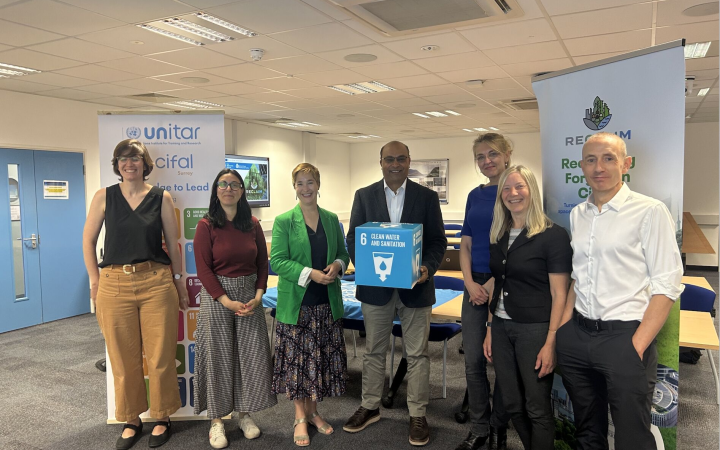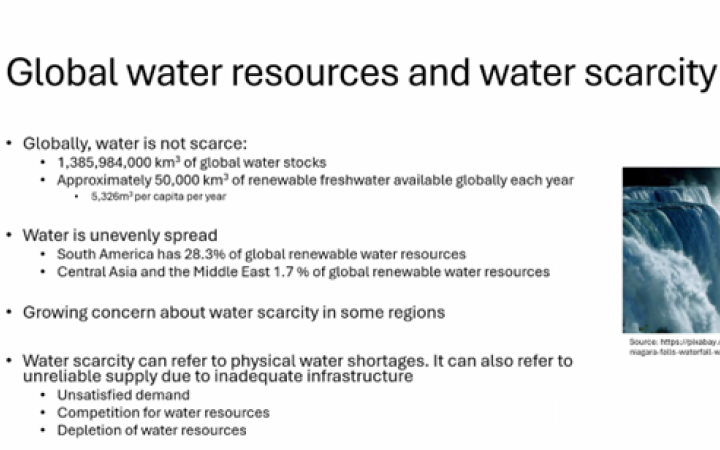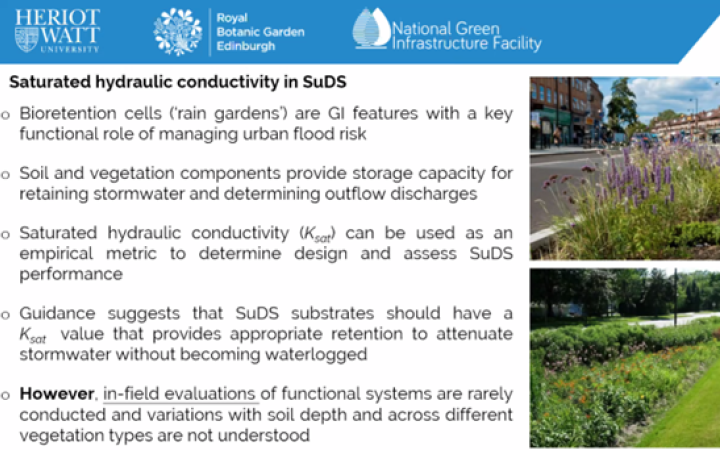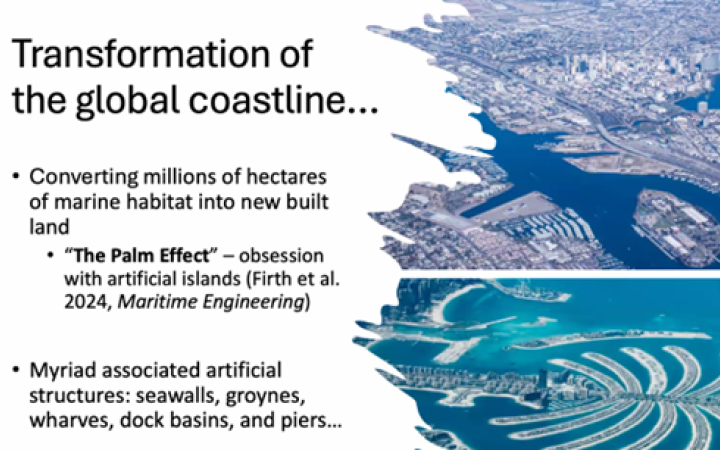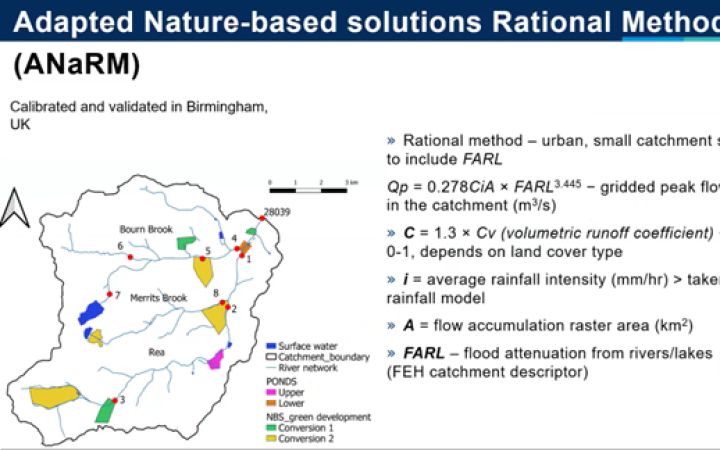26 May 2025, Geneva, Switzerland – In observance of the International Day for Biological Diversity, the UNITAR Global Water Academy, in collaboration with CIFAL Surrey and RECLAIM Network Plus (EP/W034034/1), hosted a virtual side event, ‘Streams of Change: Exploring the Intersection of Water, Agriculture, and Biodiversity’. The event brought together leading experts in climate resilience, hydrology, sanitation, and water governance to explore the intersections between urban infrastructure, sustainable agriculture, and biodiversity protection.
Framed around three core themes—clean water access, sustainable agriculture, and biodiversity management—the event emphasized the pivotal role of integrated water strategies in achieving the Sustainable Development Goals (SDGs), particularly SDG 6 on clean water and sanitation, SDG 2 on zero hunger, and SDG 15 on life on land.
The panelists included:
- Dr Ebru Canan-Sokullu, Associate Director of CIFAL Global Network, UNITAR
- Prof Amelia Hatfield, Director, CIFAL Surrey, Co-Director of the Institute for Sustainability, University of Surrey
- Prof Prashant Kumar, Director, RECLAIM Network Plus, Founding Director, Global Centre for Clean Air Research (GCARE), Co-Director, Institute for Sustainability, Professor and Chair in Air Quality and Health
- Dr Devendra Saroj, Institute for Sustainability Fellow
- Dr Jonathan Chenoweth, Institute for Sustainability Fellow
- Dr Katherine Pond, Institute for Sustainability Fellow
- Dr Daniel Green, RECLAIM Fellow, Heriot-Watt University
- Dr Belen Marti-Cardona, Institute for Sustainability Fellow
- Dr Louise Firth, RECLAIM Fellow, UCC, Ireland
- Dr Thomas Kjeldsen, Department of Architecture and Civil Engineering, Water Innovation and Research Centre, University of Bath
Dr. Canan-Sokullu opened the event by acknowledging
International Day for Biological diversity is a powerful reminder that the health of our water resources is deeply intertwined with the well-being of ecosystems and the sustainability of our food systems.
Additionally, in Prof Hatfield’s opening remarks, she emphasized that
agriculture itself accounts for 70% of global freshwater withdrawals, [...] but sustainable and unsustainable agricultural practices, I think where we are now, we see over-irrigation, we see excessive pesticide use, we see poor land management, and that has had a knock-off effect to water pollution, acquifier depletion, and a loss of biodiversity.
Panel 1: Clean Water and Sanitation for Cities and Rural Areas
Prof. Kumar opened the discussion by presenting a UK-funded multidisciplinary network focused on climate-adaptive cities. He highlighted RECLAIM’s Network Plus track record of 40 webinars and 80 expert engagements aimed at promoting green infrastructure solutions for urban resilience.
Dr. Saroj underscored that sanitation is not just a service but a human right. He advocated for culturally appropriate, closed-loop sanitation systems that enable the safe return of nutrients to agriculture, promoting a circular phosphorus economy critical for food systems sustainability.
Dr. Chenoweth offered a sobering assessment of global water scarcity. He emphasized that per capita renewable water availability, though simple, remains a reliable indicator of scarcity. Noting the excessive water footprint of meat-heavy diets and the global dependency on food trade, he stated that the core challenges lie not in water availability but in the social, political, and economic structures that impede equitable distribution.
Water is not scarce. Globally, there’s an awful lot of freshwater. The issue is not the volume of water, it’s the fact that water is unevenly spread — Dr. Chenoweth
Dr. Pond highlighted that 40% of people in Sub-Saharan Africa and Oceania still depend on unimproved water sources. She made strong links between water quality, biodiversity loss, and disease burden, stressing that the most vulnerable communities are often the least equipped to cope with these risks.
Panel 2: Opportunities and Challenges in Sustainable Agriculture
Dr. Green presented compelling data on how urban soil and climate conditions affect water flows. He introduced bioretention cells—commonly known as rain gardens—as a nature-based solution for stormwater management. These systems integrate vegetation and soil to naturally absorb and store rainwater, reducing flood risk while supporting biodiversity.
Dr. Marti-Cardona shared cross-regional case studies from Jordan and Pakistan, highlighting the dangers of groundwater overextraction. She called for data-driven integrated water resource management (IWRM) to optimize crop patterns and water allocation, enabling agriculture that is both productive and sustainable under conditions of water stress.
Every kilogram of rice production takes up 3,000 liters of water. This is not sustainable. We cannot rely on this export of rice, as we will not have enough water — Dr. Marti Cardona
Panel 3: Conservation vs. Preservation—Water's Role in Biodiversity
Marine ecologist Dr. Firth explored the ecological impact of artificial islands and coastal infrastructure. She described the “palm effect,” where built environments drastically alter marine ecosystems. While artificial structures can support marine life, they often harbor invasive species rather than native ones. Drawing from the 300-year transformation of Liverpool Docks, she showed how mussels, a filter-feeding species, naturally colonized and improved water quality, offering a model for eco-engineering green-grey infrastructure.
Dr. Marti-Cardona returned to emphasize the importance of preserving natural hydrological regimes. She called for policies that safeguard environmental flows, protect wetlands, manage sedimentation, and prevent eutrophication. In particular, she warned of the lasting damage mining activities cause to aquatic systems, stressing the need for holistic approaches to pollution control.
Case Studies: Innovation through RECLAIM
Dr. Kjedsen presented an innovative model—ANaRM—that uses machine learning to evaluate debris in urban rivers based on image recognition. The model helps cities determine whether waterways are blocked, enabling efficient maintenance. Pilot studies demonstrated the tool’s viability, with plans for a user-friendly app and low-cost camera systems that democratize waterway monitoring.
Concluding Reflections
Dr. Canan-Sokullu and Prof. Amelia Hatfield closed the event by reaffirming UNITAR’s and CIFAL Surrey’s commitment to interdisciplinary, inclusive, and scalable water solutions. They stressed the importance of leveraging academic partnerships, local knowledge, and technological innovation to build water systems that are equitable, resilient, and ecologically sound.
Water touches every aspect of our lives—from what we eat to how we build our cities, only by bridging science, policy, and community can we ensure that water truly becomes a stream of change — Dr. Canan-Sokullu.
UNITAR Course Announcement
In alignment with the event’s themes, UNITAR also mentioned its latest e-learning programme: "Foundations of SDG 6: Clean Water and Sanitation." This interactive course is designed to equip participants with the tools to analyze SDG 6 targets, implement sustainable water management strategies, and apply context-sensitive solutions.


